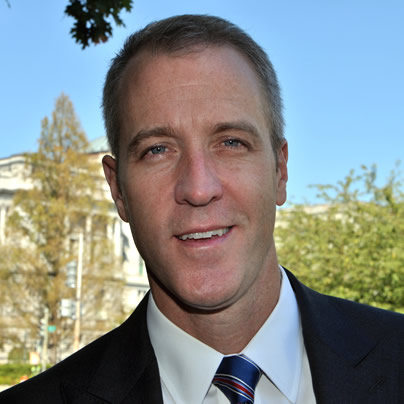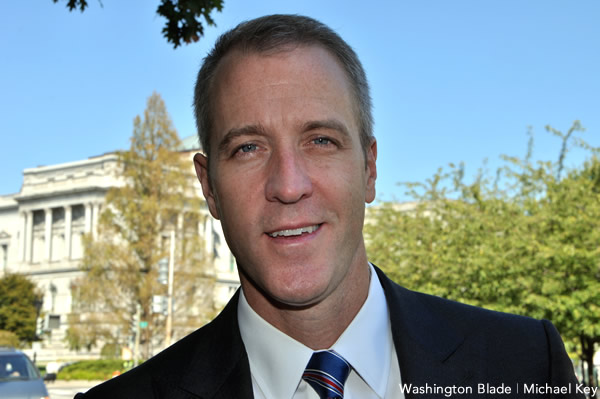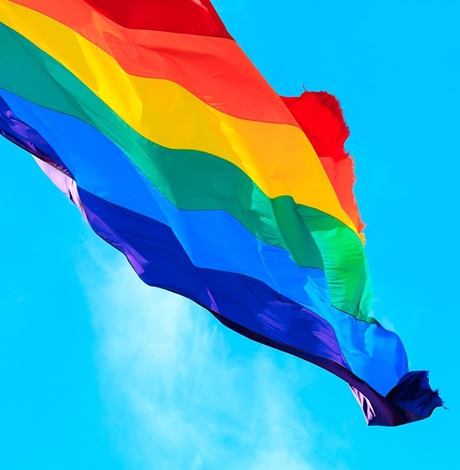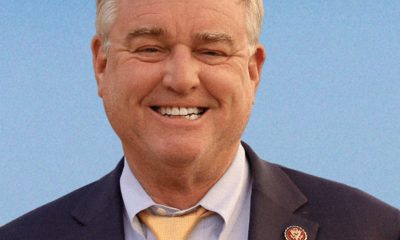National
Election Day brings more out gays to Congress
But balance of power will likely prevent action on LGBT bills


Sean Patrick Maloney was among the openly gay people elected to Congress (Washington Blade file photo by Michael Key)
The results on Election Day were hailed as a milestone as a record number of openly LGBT people were elected to Congress, although prospects for the passage of pro-LGBT legislation next year don’t look promising.
In addition to re-electing President Obama and approving the marriage equality side on ballot initiatives in four states, voters elected at least six openly LGB lawmakers to Congress in addition to electing pro-LGBT lawmakers like Elizabeth Warren in Massachusetts and Sherrod Brown in Ohio.
Tammy Baldwin made history by becoming the first openly gay person elected to the U.S. Senate (see related story) as incumbent Reps. Jared Polis (D-Colo.) and David Cicilline (D-R.I.) were re-elected. Joining them will be Sean Patrick Maloney, who’ll be the first openly gay congressman from New York; Mark Pocan, who’ll occupy the seat Baldwin held in the House; and Mark Takano, a California Democrat who’ll be the first openly gay person of color elected to Congresss.
As of press time, the race to represent Arizona’s 9th congressional district between bisexual Democratic candidate Kyrsten Sinema and Republican Vernon Parker wasn’t yet called. However, Sinema maintained a slim lead in the votes that were already tabulated. If elected, Sinema would be the first bisexual member of Congress.
Chuck Wolfe, CEO of the Gay & Lesbian Victory Fund, acknowledged the night resulted in historic wins in terms of LGBT representation at the federal level of U.S. government.
“It’s without a doubt historic,” Wolfe said. “I think you can talk about the fact that it was history-making, and those that won will be making history for years to come.”
The election results means Congress will look very different in terms of LGBT representation in the wake of Rep. Barney Frank’s (D-Mass.) retirement and Baldwin leaving the House for the Senate. The results also mean that number of openly gay House members will go from four to at least six.
Gay candidates who didn’t win were Republican Richard Tisei, who lost his bid to unseat pro-LGBT Rep. John Tierney (D-Mass.), and lesbian Democrat Nicole LaFavour, who lost her bid to unseat Rep. Mike Simpson (R-Idaho). LaFavour wasn’t endorsed by the Victory Fund.
Despite the excitement, the Election Day results in some respects resulted in the status quo for the legislative and executive branch of the U.S. government from what existed after the 2010 election when no pro-LGBT legislation passed Congress. Democrats retained control of the White House and the Senate, while Republican remain in control of the House.
As of press time, the Senate was poised to have 54 senators caucus with the Democrats and 45 senators caucus with the Republicans, although the Senate race in North Dakota remained too close to call. That would mean a net gain of one Democrat in the Senate. In the House, Republicans retained control of the chamber, but had a slimmer majority of 232 seats while Democrats claimed 191 seats — with 12 races being too close to call.
Chad Griffin, president of the Human Rights Campaign, acknowledged in a conference call with reporters on Wednesday that these results still mean a pro-LGBT majority doesn’t exist in Congress, making the passage of favorable legislation difficult.
On the issue of federal workplace non-discrimination protections, which remain an outstanding issue for the LGBT community, Griffin said in response to a question from the Washington Blade the votes won’t be there to pass legislation known as the Employment Non-Discrimination Act.
“We need to acknowledge that although we certainly made some gains in the Senate, and potentially some gains in the House, we are still short of having a vote for an inclusive ENDA in the House,” Griffin said. “We need to be realistic about that.”
Griffin said “more successes could be seen” on the state and local level and called on the White House to revisit the idea of an executive order barring federal contractors from discriminating against LGBT people, which it said in April it wouldn’t issue at the time.
“It is my hope and belief that we can get an executive order out of this White House,” Griffin said. “It is something that should be done and we will continue to urge our newly re-elected president to do. That would not be the full solution, but it would be a step toward the end goal.”
Tico Almeida, president of Freedom to Work and one of the leading advocates of the executive order, also said it’s time for the White House to reconsider to its decision in the wake of the Election Day results.
“Yesterday was a turning point for our LGBT movement and President Obama has proven that elected officials can stand strongly on the side of LGBT fairness without fear of voter backlash,” Almeida said. “We will continue to push for the president to sign the executive order as soon as possible because every day that passes is another day in which taxpayer money can be squandered on anti-LGBT workplace harassment and discrimination.”
Asked whether the White House would revisit this idea, Shin Inouye, a White House spokesperson said, “I have no updates for you on that issue.”
Almeida also said action could be seen in the Senate to pass ENDA and called for a hearing, mark-up, and full Senate vote in 2013 when lawmakers convene at the start of the next Congress.
“One lesson from recent LGBT advocacy efforts is that we should not wait until the second year of a congressional session to move legislation forward because that’s when some elected officials start getting nervous about the upcoming election and the legislative clock starts to run out of legislative days,” Almeida said.
In the addition to workplace non-discrimination protections, action could be done at the federal level to repeal the Defense of Marriage Act, which prohibits federal recognition of same-sex marriage. Griffin said during the conference call HRC would “continue to push forward” in Congress, but expressed skepticism about passage of any legislation.
“We do have to remember the leadership in the House of Representatives is not a pro-equality set of leaders, so we still have a lot of work to do there, but I can believe we can continue this momentum,” Griffin said.
Griffin placed greater emphasis action from the Supreme Court, which on Nov. 2o will determine whether it will take up litigation challenging California’s Proposition 8 and Section 3 of DOMA. If the court declines to hear the Prop 8 case, it would mean same-sex marriage would almost immediately return to California.
Another question is which states will advance pro-LGBT legislation or relationship recognition bills in the wake of the Election Day results. Griffin said he expects progress there, but said it’s “very early” to determine which states will see action.
The White House
EXCLUSIVE: White House Press Secretary Karine Jean-Pierre on speaking out and showing up
On the two-year anniversary of her appointment, she says, ‘representation matters’

Karine Jean-Pierre sat down with the Washington Blade for an exclusive interview in her office on Tuesday, a week before the two-year anniversary of her appointment as America’s first Black and first openly queer White House press secretary.
Her history-making tenure has come at an especially fraught time for LGBTQ people.
The Biden-Harris administration has been widely celebrated as the most pro-equality in history. Over the past four years, rights and freedoms were expanded through the passage of landmark legislation and the enactment of bold new policies by federal agencies like the FDA and U.S. Department of Education, while the president elevated record-breaking numbers of LGBTQ appointees to serve in the highest levels of government.
At the same time, conservative Republicans have led an unprecedented legislative assault on queer people, especially transgender and gender-expansive youth, which has been accompanied by an escalation of dangerous fear and hate-mongering rhetoric against the community and spikes in bias-motivated acts of violence as well as depression, anxiety, self-harm behaviors, and deaths by suicide.
On these matters Jean-Pierre has often spoken out, addressing reporters from the lectern in the West Wing’s James S. Brady Press Briefing Room in remarks that have often gone viral and driven news coverage.
Reflecting on her tenure, the 49-year-old press secretary explained why she is uniquely positioned to leverage her influence as the most visible spokesperson for President Joe Biden, Vice President Kamala Harris, and the administration — at this pivotal moment for LGBTQ people both at home and abroad.
Leadership comes from the top
“Representation matters,” Jean-Pierre said. “And the president was certainly very aware of that, and wanted to make sure that he put together the most diverse administration,” she said, “and he did that.”
About 14 percent of appointees in the Biden-Harris administration identify as LGBTQ, including U.S. Transportation Secretary Pete Buttigieg and Adm. Rachel Levine, assistant secretary for health at the U.S. Department of Health and Human Services. In his first term, Biden has appointed a record-breaking 11 LGBTQ judges to the federal bench, tying with the number who were confirmed under former President Barack Obama over the course of eight years.
“I am in this job because the president of the United States believed and wanted me to speak on behalf of him and said, ‘You have my voice, and you know how to speak for me, and this is the role that I want’ — I mean, that’s why he chose me,” she said.
Jean-Pierre stressed that she is able to condemn “these bad bills, these awful bills, these really hateful, prejudiced, anti-LGBTQ+ bills” because of “this president” — and not just by virtue of his appointment of her to the role of press secretary, but also because “he believes it is important to speak out.”
“Silence is complicit,” she said. “You know, that’s something that you hear from this president all the time: We cannot be silent in this moment. We cannot. Not when we see these anti-LGBTQ+ bills” nor when attempts are made to restrict reproductive rights or other freedoms.
When vulnerable queer youth are being targeted, Jean-Pierre said, “we have to do everything that we can — as an administration, as the White House, as the federal government — to protect them, and that’s what I get to do” because “this president allows me to speak out and show up.”
Jean-Pierre also pointed to Biden’s remarks in defense of the LGBTQ community and other marginalized groups during his State of the Union addresses and other major speeches.
“One of the things that he has said that always touches me is he says, ‘trans kids are some of the most impressive, brave people’ that he has seen,” she said. The president understands that “This is not about politics. This is about the right thing to do. And protecting lives.”
“And I say all of this to say it matters. It matters who sits behind that Resolute Desk. It matters who’s the president of the United States,” Jean-Pierre said.
The press secretary added that Biden’s actions as president affirm his verbal commitments to protect, support, and defend the LGBTQ community.
“The president signed an executive order to make sure that we were lifting up LGBTQ+ rights on the federal level, to make sure that policies that we were putting out there were taking steps toward protecting families, protecting youth, addressing mental health amongst young people, and in the community, and that was something that was really important for the president to do.”
She described a pivotal moment in the White House when, after the U.S. Supreme Court struck down Roe v. Wade’s constitutional protections for abortion with a 6-3 ruling in Dobbs v. Jackson Women’s Health Organization (2022), conservative Justice Clarence Thomas signaled his interest in revisiting other cases, including those that established the right to marriage equality.
“So, one of the things that came out of Congress in a bipartisan way was protecting marriage, protecting marriage equality,” Jean-Pierre said, “and I remember when the president signed [the Respect for Marriage Act] in December of 2022, and how beautiful that was knowing that that was protected by law.”
“We have made sure to do what we can on the federal level,” she added, noting that, “Obviously, there’s legislation that we have to continue to push for,” including the Equality Act — which would codify nondiscrimination protections for LGBTQ Americans — “but we do what we can from this side of things.”
The importance of diversity of lived experience
The president also understands the value of narrative storytelling in policymaking and governance, Jean-Pierre said, noting how Biden often talks about economic issues by relating to the struggles of working families with his journey from humble beginnings in Scranton, Pa.
Likewise, Jean-Pierre said that drawing from her lived experiences “helps me understand policy a little bit more and telling stories around policies a little bit more.” For example, she sees the danger of anti-LGBTQ laws targeting youth not just because of her identity as a member of the community — but also as the mother of a nine-year-old.
In February, Jean-Pierre spoke out repeatedly after a nonbinary Oklahoma teen named Nex Benedict died, in what was later ruled a suicide, after enduring months of bullying over their sexual orientation and following their state’s passage of a bill prohibiting trans students from using restrooms and facilities consistent with their gender identity.
“I know that for many LGBTQ+ students across the country this may feel personal and deeply, deeply painful,” Jean-Pierre said in remarks to reporters during the opening (the “topper”) of her press briefing on Feb. 23.
“Nex Benedict and so many young people are dying by suicide,” she told the Blade. “And that hurts. That’s an incredibly hurtful thing. Because they were bullied, because they were attacked, because they don’t feel free.”
“As a parent, as a mom, I do everything that I can to make sure that [my daughter] is protected,” Jean-Pierre said. “And what I want for my child, I want for every child, so that does hit differently, because it’s very personal.”
The press secretary recalled how she met two mothers at an event last year and, in separate conversations with the women, learned how they planned to leave their respective home states — Texas and Oklahoma — because they had trans children and felt unable to protect them amid the legislative attacks.
“Can you imagine,” she asked, “you’re raising your child in a community that you are familiar with” when suddenly, “there is a piece of legislation that’s going through the state legislature that gets signed by the governor and it is telling you that your child is in danger?”
Jean-Pierre also recognizes how her professional background and experience have equipped her for the briefing room and other duties of her role as White House press secretary.
Prior to joining Biden’s 2020 campaign and then the Biden-Harris administration, she worked as a political analyst for NBC News and MSNBC, having also served as a senior adviser and national spokesperson for MoveOn, the progressive public policy advocacy group.
Jean-Pierre began her career working on political campaigns and fundraising before joining the faculty of her alma mater, Columbia University, where she was a lecturer in international and public affairs.
“There’s something to growing and experiencing and taking chances and jumping from one thing to another,” she said, “understanding that you’re learning from the last thing and what you’re learning from the last thing you’re going to take to the next experience.”
The president, Jean-Pierre said, “had watched me do TV and watched me in my roles prior, and really believed that I was the person that he wanted” for the press secretary role.
Ultimately, “whether it’s making sure I am empathetic, sympathetic to what people are going through as a mom, as someone that belongs to multiple communities, I get to do that. Whether it’s the media and understanding how the media works, how TV works, how communicating with the press works, I’ve done that, so I’m able to bring that to the podium,” she said.
‘Lifting up issues that matter‘
In the immediate aftermath of Benedict’s death, Jean-Pierre noted that LGBTQ advocacy groups and individuals had sought to “get more attention to what happened there,” while the Biden-Harris administration wanted folks to understand “that we’re watching, we’re seeing what is happening, and we’re going to speak” about it.
“We’re not going to be silent, here,” she said. “We were very purposeful about it.”
In hindsight, Jean-Pierre said, her remarks from the podium made a real impact. “It brings coverage; it brings the White House press corps and others to cover what we’re saying. That is why it is so important what we do at the podium; it is so important what we do in this press briefing room — lifting up issues that matter to the American people.”
The press secretary added, “sometimes it’s not even an issue that’s popular. It’s something that needs to be spoken to, because it is something that could lead to a dangerous situation; something that could oppress a community, harm a community — and we get that; this president gets that, this administration gets that.”
Initially, there was very little press coverage of Benedict’s death, Jean-Pierre said, but “we wanted to really lift up what was happening,” because “it wasn’t just Nex Benedict. It was a story of many, many people in that community who were being bullied, who were being attacked. And we needed to speak to that” especially amid the hundreds of bills targeting the rights of queer youth in Oklahoma and across the country.
In another instance recalling her comments from the briefing room, Jean-Pierre stressed how it was important for the administration to “take on the governor” of Florida, Ron DeSantis (R), over his efforts to target the LGBTQ community by banning books, imposing curriculum restrictions, and limiting educators’ ability to be out at work.
Doing what’s right — regardless of the backlash
Jean-Pierre was quick to brush aside the question of whether she considers the risk of incurring backlash from the right when deciding whether to speak out on matters of LGBTQ rights.
Blowback “happens all the time,” she said. “Every day!” So, “I just don’t pay attention to it. We have to do the right thing and we can’t live in fear, here.”
The choice to be silent about a problem is the choice to be complicit, and not only does silence forestall any progress toward addressing the issue at hand, but it also constitutes an abrogation of one’s responsibility as a leader, Jean-Pierre said.
“The president is very clear about that,” she said. With respect to issues like dangerous anti-LGBTQ legislation, “you can’t be silent” because “people’s lives are at stake.” Ultimately, “The backlash is going to be the backlash, but we’ve got to do the right thing and history will remember where we stood.”
The Biden-Harris administration believes this principle extends to America’s leadership on the international stage, Jean-Pierre said, in her response to a question about U.S. Rep. Tim Walberg’s (R-Mich.) travel to Uganda last year to speak in defense of the country’s draconian Anti-Homosexuality Act.
She stressed that the law, which criminalizes homosexuality and imposes the death penalty in some cases, is “dangerous and undermines the rights of all citizens. And the president has been very clear, the Biden-Harris administration has been very clear, that no one should live — and I’ve said this before — in constant fear.”
Rather, Jean-Pierre said, “They should feel safe in their community, they should feel protected, and no one should be subjected to violence and discrimination. It is not what we believe, whether it’s here in this country or abroad.”
Since the legislation was made effective in May 2023, she noted, “we’ve taken several accountability actions, including restricting visa entry to the United States, restricting economic support to the government, and sanctioning officials who abuse human rights.”
Jean-Pierre added that, “we’re also deeply troubled by the copycat anti-LGBTQ+ legislation around the world,” which is “why it’s important what we do as the United States, because we’re leaders. And when you’re seeing other countries trying to implement and copycat the same thing, you need the United States to stand up and speak out against it. And that’s leadership.”
The administration’s robust response “sends a message around the world, that we do believe in human rights; we do believe that people should be protected; we do believe that violence and discrimination is not OK,” Jean-Pierre said. “And we lead by example.”
Likewise with respect to her comments from the podium, she said. “And [those remarks] went viral, because we spoke to it very loudly, very clearly,” in what was “an important moment for the community here but [also for] the community abroad, to hear from us, [that] we’re not afraid to talk about this because we have to and we understand our role in the world.”
The White House
Jane Rigby awarded Presidential Medal of Freedom

Sitting among a diverse and venerable group of Americans from every walk of life on the dais in the East Room of the White House on May 3 was lesbian and NASA astrophysicist Jane Rigby, awaiting her turn to be honored by President Joe Biden who would bestow the Presidential Medal of Freedom, the nation’s highest civilian honor, on her.
Rigby, an astronomer who grew up in Delaware, is the chief scientist of the world’s most powerful telescope who alongside her team operating NASA’s James Webb Space Telescope, studies every phase in the history of the universe, ranging from the first luminous glows after the Big Bang, to the formation of solar systems capable of supporting life on planets like Earth, to the evolution of the solar system.
A member of Penn State’s Class of 2000, Rigby graduated with a bachelor’s degrees in physics and astronomy. She also holds a master’s degree and a PhD in astronomy from at the University of Arizona. Her work as the senior project scientist for NASA’s Webb Telescope includes studies on how galaxies evolve over cosmic time and she has published more than 140 peer-reviewed scientific papers.
Rigby was named to Nature.com’s 2022 list of 10 individuals who shaped science and to the BBC’s list of 100 inspiring and influential women in the same year. Rigby had postdoctoral fellowships at Carnegie Observatories in Pasadena, Calif., before landing her job at Goddard Space Flight Center. In 2013 Rigby was awarded the Robert H. Goddard Award for Exceptional Achievement for Science.
A founding member of the American Astronomical Society’s Working Group on LGBTQ Equality in January 2012, now called the Committee for Sexual Orientation and Gender Minorities in Astronomy, Rigby serves as its Board Liaison until her term expires this June.
The lesbian astrophysicist in an interview for SGMA’s website spoke about her experiences including coming out:
“I’ve been out since 2000. My story’s simple — I fell in love with a fellow grad student in the department. It was a close-knit department, so hiding would have been ludicrous. Nor did I want to hide the best thing in my life! So, we were out as grad students. I certainly heard people say awful homophobic things at work there. They weren’t directed at me, and they weren’t said by people with power over me. If I recall, I was much less afraid of homophobic discrimination at work, than I was afraid of the two-body problem, and the lack of support we would receive as a same-sex couple in astronomy. That fear turned out to be justified. I’ve seen numerous different-sex couples get a wide range of support in solving the two-body problem, which was never offered to us,” she told the interviewer.
She reflected on American astronaut and physicist Sally Ride, her childhood role model who had an impact on her career:
“One of my biggest role models when I was young was Dr. Sally Ride. A few years ago, on her deathbed, Dr. Ride chose to write in her obituary that her life partner had been a woman. Dr. Ride was the most influential woman scientist when I was growing up — the person that made me say, “I want to do THAT when I grow up.” It was because of her that I realized that astrophysics was a profession, that physics was a subject girls could study, that NASA needed astrophysicists. So I’m so … amused, I suppose, that Sally Ride was this influence on my life’s path, at a time when I was completely unaware that it was even possible to *be gay* — and at the same time, she was gay, in love, and deeply closeted to keep her job.”
The interviewer noted that “for some women being gay is a cause for concern at the work place. Some say they were unsure about how to turn their sexual orientation into a positive aspect of their work persona.” Then asked Rigby what is your view on this?
“My experience is that absolutely I am a *better* astronomer because I’m queer. For a few reasons. First, I see things different than my colleagues. On mission work, as we weigh a decision, my first thought is always the community impact: ‘If we do things this way, who benefits, and who gets left out in the cold?’ Will this policy create inclusion, or marginalization? I think about science in terms of community-building. What team do we need to tackle a given science problem, with skills that are different from mine? Absolutely I think that way because I’m an outsider, because I’ve been marginalized. And because community-building is central to LGBTQ culture,” she said.
Editor’s note: You can read Rigby’s complete SGMA interview here: (Link)
Married to Dr. Andrea Leistra, Rigby, her wife and their young child reside in Maryland not far from her workplace at the NASA Goddard Space Flight Center in suburban Washington and when not studying the universe is often found on the neighboring Chesapeake Bay wind boarding, a favored pastime.
Also honored in the ceremony Friday were a former U.S. vice president, a civil rights worker and martyr, two former Cabinet secretaries — one a former U.S. secretary of state, a speech writer for the late Dr. Martin Luther King Jr., an Olympian and gold medalist, and one of the most powerful woman political leaders and the speaker emeritus of the U.S. House of Representatives, among others, and LGBTQ advocate Judy Shepard.
WATCH
Federal Government
US Census Bureau testing survey on LGBTQ households
Agency proposing questions about sexual orientation and gender identity

The U.S. Census Bureau is seeking public comment on a proposed test of sexual orientation and gender identity questions on the American Community Survey. The test would begin this summer and continue into next year.
The Census Bureau published the request as a Federal Register notice. In its press release the agency noted that the ACS is an ongoing survey that collects detailed housing and socioeconomic data. It allows the Census Bureau to provide timely and relevant housing and socioeconomic statistics, even for low levels of geography.
As part of the process for adding new questions to the ACS, the Census Bureau tests potential questions to evaluate the quality of the data collected.
The Census Bureau proposes testing questions about sexual orientation and gender identity to meet the needs of other federal agencies that have expressed interest in or have identified legal uses for the information, such as enforcing civil rights and equal employment measures.
The test would follow the protocols of the actual ACS — with one person asked to respond to the survey on behalf of the entire household. These particular questions are asked about people 15 years of age or older. Households are invited to respond to the survey online, by paper questionnaire or by phone.
The current Federal Register notice gives the public a final opportunity to provide feedback before the Census Bureau submits its recommendations to the Office of Management and Budget for approval. The public may provide feedback through May 30 online.


















